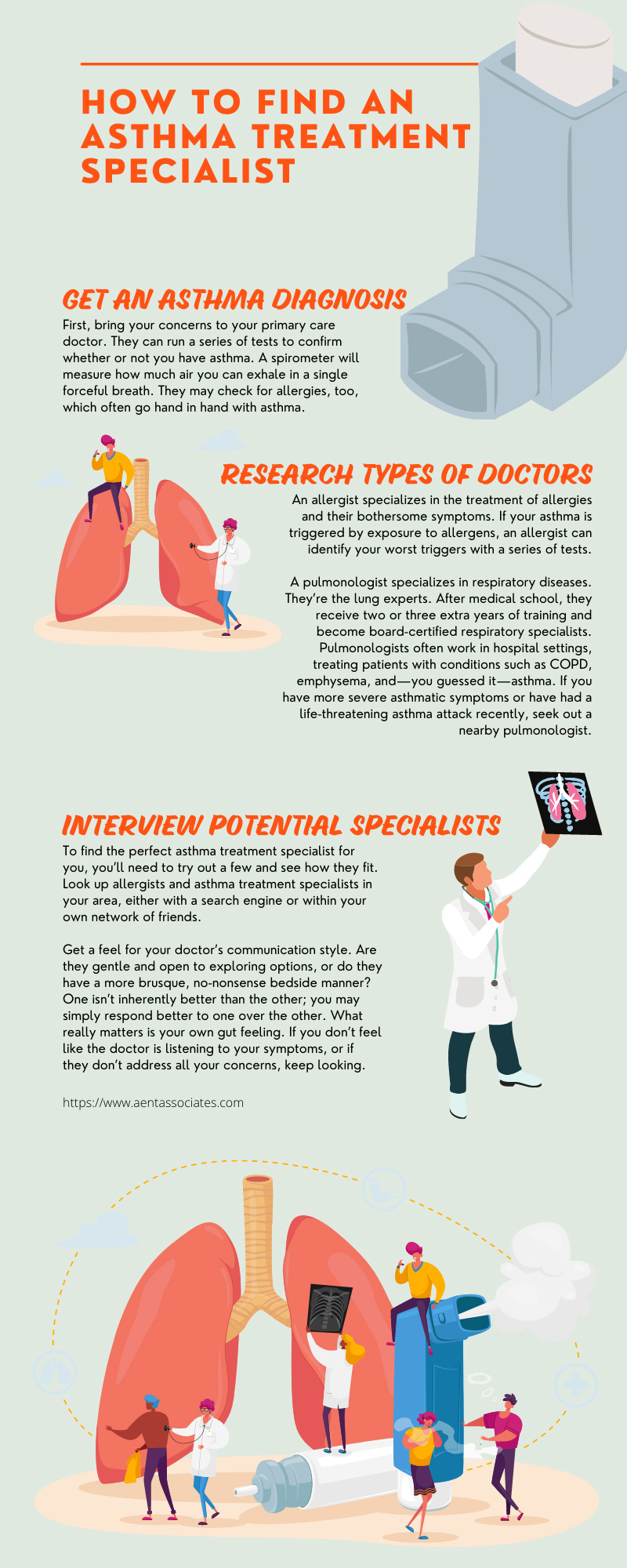
In order to keep asthma attacks and flare-ups at bay, you need to work with a doctor on a care plan. An asthma treatment specialist can be invaluable in creating this care plan, even more so than a general practitioner. There are multiple types of asthma treatment specialists. Depending on your symptoms and needs, you may do well to research the different varieties of specialists and choose one that’s right for you. Millions of Americans suffer from asthma, but luckily, there’s a whole area of medical practice dedicated to treating it. Learn how to find an asthma treatment specialist and set off on the road to better health.
Get an Asthma Diagnosis
First, bring your concerns to your primary care doctor. They can run a series of tests to confirm whether or not you have asthma. A spirometer will measure how much air you can exhale in a single forceful breath. They may check for allergies, too, which often go hand in hand with asthma.
A diagnosis is the first step to better treatment for your condition. You can learn what triggers your symptoms so you can more easily avoid those triggers in the future, especially if you suffer from allergies. When you know whether or not you have asthma and how your symptoms manifest themselves, you have more knowledge to bring to your asthma treatment specialist. Ask your primary care doctor for recommendations in your area and start the search right away.
Research Types of Doctors
What sort of physician will be most helpful in treating your asthma?
As the job title implies, an internist is a doctor who specializes in internal medicine and maladies of the organs. They differ from general practitioners in that they have completed three extra years of specialized medical training. An internist treats illnesses such as heart disease and diabetes, but they also have valuable insight regarding your lungs and throat. Think of your internist like a general-purpose doctor; they’ve got answers to a wide variety of questions.
An allergist specializes in the treatment of allergies and their bothersome symptoms. If your asthma is triggered by exposure to allergens, an allergist can identify your worst triggers with a series of tests. Look up allergists near you and find one that’s a good fit, even if it means interviewing multiple doctors. Any asthma treatment specialist should take your symptoms seriously and discuss a variety of treatment options with you. If your asthma and allergies often flare up in sync with one another, allergy medication and treatment could also alleviate your asthmatic symptoms. As you search for specialists in your area, you may see allergy-specific doctors referred to as either “allergists” or “allergist-immunologists.” Either way, these specialists have years of extra training that allows them to pinpoint those triggers and treat them more effectively than a general practitioner. The expert doctors at Allergy & ENT Associates are dedicated to treating asthma and allergies with the care you deserve.
A pulmonologist specializes in respiratory diseases. They’re the lung experts. After medical school, they receive two or three extra years of training and become board-certified respiratory specialists. Pulmonologists often work in hospital settings, treating patients with conditions such as COPD, emphysema, and—you guessed it—asthma. If you have more severe asthmatic symptoms or have had a life-threatening asthma attack recently, seek out a nearby pulmonologist. Ask your primary care doctor for their best recommendations. Look up pulmonary rehabilitation therapists, too. While they aren’t doctors, they can teach you a variety of techniques to help you exercise without triggering your symptoms. Pulmonary rehab will help you manage your symptoms and strengthen your breathing. The therapist will teach you how to exercise without putting extra stress on your lungs.
Interview Potential Specialists
To find the perfect asthma treatment specialist for you, you’ll need to try out a few and see how they fit. Look up allergists and asthma treatment specialists in your area, either with a search engine or within your own network of friends. If you have any loved ones with asthma or other respiratory woes, ask them which doctors they recommend. Once you’ve got a list of options, start making appointments. During your first appointment with a new doctor, get to know them a little better.
Where did they go to medical school? More importantly, where did they complete their post-graduate training? If you’re seeing a specialist, make sure they’ve received the years of necessary training in their field at a reputable institution. Whether it’s immunology or pulmonology, you should feel secure that they’re experts in that subset of medicine.
Are they board-certified? They should be. When your doctor completes those additional years of specialized study, they receive that certification to demonstrate their expertise. If the doctor is a specialist—such as an immunologist or pulmonologist—their board certification is like a diploma. It confirms their expert status in that field.
What hospitals does the doctor work with? If you’re admitted to the hospital following an asthma attack, will you be able to see this specialist while you’re there?
Get a feel for your doctor’s communication style. Are they gentle and open to exploring options, or do they have a more brusque, no-nonsense bedside manner? One isn’t inherently better than the other; you may simply respond better to one over the other. What really matters is your own gut feeling. If you don’t feel like the doctor is listening to your symptoms, or if they don’t address all your concerns, keep looking. You should trust that you’re in good hands.
When your asthmatic symptoms flare-up, have the number of a trusted specialist on hand. Many medical practices, such as Allergy & ENT Associates, specialize in allergic symptoms and respiratory diseases. An asthma treatment specialist will work with you to devise a personalized care plan. Depending on how your asthma manifests itself, you may benefit from a specific type of doctor such as a pulmonologist or allergy specialist. It may take some time and a little trial and error, but knowing how to find an asthma treatment specialist could save your life one day.




